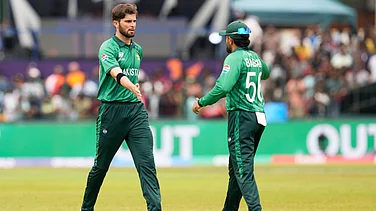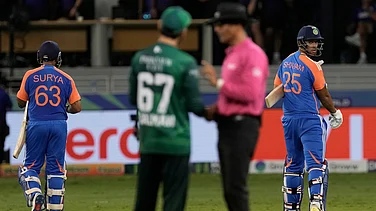"I guess match-fixers would be scared to approach me, given the way I am known to react."
Mohammed Azharuddin in an interview to Rediff on the Net.
That blistering statement by India's former cricket captain Mohammed Azizuddin Azharuddin in December 1998 sounds mindlessly hollow in retrospect, considering the slew of match-fixing allegations that have stuck on to him with or without evidence. His image had long gone into a free-fall, with most tending to see him as a Hyderabadi Machiavelli in cricket flannels.
Unsubstantiated rumours of his involvement in match-fixing have been swirling about for some time. But Hansiegate galvanised the country's investigative agencies to dig deep. Now, with Hansie Cronje's confession to the King Commission that Azhar had dispatched Mukesh Gupta and Hamid Cassim to fix matches, it could well signal the last nail in his coffin.
Today, the CBI, Income-Tax Department and the Enforcement Directorate are probing a deluge of accusations against Azhar. A sampling of some of the leads being pursued:
While these are definite leads being actively pursued by the investigative agencies, former cricket officials who have been on tours abroad have telling tales to recount about Azhar. Says one official who was part of the tour to South Africa in January-February 1997: "We had beaten Zimbabwe to qualify for the final against South Africa in Durban and we decided to have a big party." Azhar was the only one who stayed away. "Obviously, he was disappointed because we won. He scored 2 runs in the match and someone authoritatively told me he had placed bets," says the former official. According to cricketers and board officials, Azhar had an "unhealthy rapport" with the South African team manager, Ghoolam Raja. "All of us knew there was something more than professional interest," says a bcci official.
Justice Y.V. Chandrachud, who investigated allegations of match-fixing, is in possession of audited and unaudited lists of Azhar's money earned over 14 years of playing cricket (match fees, logo money and endorsement contracts). When Outlook deposed before the one-man commission in 1997, Justice Chandrachud took a long, hard look at the disparity between the two lists and said: "I know this is the worst case. If you ask him (Azhar), he will say they were gifts from friends and admirers. But tell me, how many would give away flats and expensive cars?"
His passion for the good life is legion. Platinum watches (worth $15,000, of which he has two), Armani and Versace suits, flashy cars and dining out in expensive hotels has become a habit with him. A uae-based Pakistani jeweller had gifted a top-of-the-line Mercedes Benz during the Coca-Cola trophy in November 1998, which raised several eyebrows in the cricket establishment. "Even during the 1996-97 West Indies tour, Azhar bucked the official accommodation given to the players by the bcci," says an official.
The Mumbai police reckons Azhar has several benami properties in the city besides his two flats in Bandra. "If you take into consideration his income, it does not match up to his lavish lifestyle and properties," says a police officer. In fact, Azhar paid Rs 99 lakh in mehr to his first wife, Naureen, after the divorce in November 1996.
The chief commissioner of income-tax in Hyderabad, C.V. Padmanabhan, refused to elaborate on the nature of investigations being carried out on Azhar. "My assessing officers are on the job. That is all I will say for the moment," he told Outlook. But S.C. Parija, DG (investigations) of the I-T Department in Delhi, was barely more forthcoming. "We are in the investigative mode. Trying to unearth unexplained assets and expenditure takes time," he says. Parija maintains the process could be time-consuming. Assessments have to made, notices served and penalties confirmed if undeclared assets or monies are discovered. "Verification can take time and we have to be like angels and tread carefully," he points out.
Mukesh Gupta, the mysterious businessman introduced by Azhar to Cronje during the third Test match in January 1996, and who Cronje says offered him $30,000, may be just one of the many "middlemen" Azhar encountered in his 15-year career, say former officials. "He had this uncanny ability to make friends with such people," says a former manager. But in all cases, vouchsafe his colleagues, he was careful never to be seen with them.
Another case in point is of Ashraf Patel, the Mumbai diamond trader mysteriously killed in April. Patel played a key role in getting Azhar the lucrative Tissot watch modelling contract. A few days prior to Patel's death, Azhar was dining with him. Jaijeet Singh, Mumbai's deputy commissioner of police (Zone II), says Ashraf was part of the betting syndicate. "He was involved in match-fixing deals and had links with the bookie network in Dubai and Sharjah," says Singh. Additional commissioner Arup Patnaik, in charge of the investigation, says: "Our investigations have revealed Patel was gunned down by Chhotta Rajan's men. The motive is unknown."
That Azhar's name figured prominently in transcripts recorded by the Mumbai police and the Directorate of Revenue Intelligence (dri) in the '90s is well known. Rakesh Maria, the Mumbai police officer who has spent considerable time cracking the underworld-cricketers-bookie nexus, has said Azhar was neck-deep in match-fixing. Even former revenue secretary M.R. Sivaraman has told Outlook Azhar was one of four cricketers who figured in the dri taps.
Azhar denies the allegations. He sees a conspiracy behind this attack and is using the 'minority card' to explain the welter of charges. He says a clique consisting of Ravi Shastri, Prabhakar and Sunil Gavaskar were out to malign him in recent interviews.
It will take a lot of explaining on the part of Azhar when the CBI and IT authorities press ahead with their inquiries. Till such time, his only refuge can be stonewalling. But for how long?


























